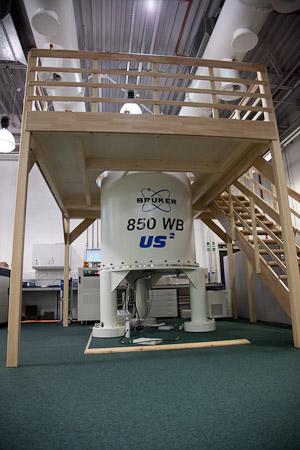850MHz Solid State NMR
Various MAS NMR probes (Bruker and Varian) that service all magnets on the NMR suite.
|
Location
|
Millburn House, University of Warwick
|
Custodian
|
Professor Mark Smith, NMR group
|
Applications
|
Solid-state NMR spectroscopy provides information about the structure of solids and is especially suitable to study disordered materials which lack long range order. Solid-state NMR uses nuclear spin as a “local probe” and in contrast to X-Ray diffraction, is suitable to study short range arrangements in materials. It can be also used to study the structure and conformations of single molecules, the interaction between various molecules and nuclei, local dynamics, kinetics and dynamics at molecular levels. The systems of interest can range from small organic or inorganic molecules, to a mid-sized clusters or peptides up to large structures as proteins or polymers. |
Specification
|
- 7mm Bruker HX MAS probe for the 7.1 T instrument
- 3.2 mm Bruker HX MAS probe for the 9.4 T instrument
- 3.2 mm Bruker F/HX MAS probe for the 11.7 T instrument
- 2.5 mm Bruker HX probe for the 14.1 T instrument
- 4mm Bruker HX MAS probe for the 14.1 T instrument
- 9.5 mm Varian HX MAS probe for the 14.1 T insrtument
|

